高一英语开学第一课课件(27张PPT)
文档属性
| 名称 | 高一英语开学第一课课件(27张PPT) |  | |
| 格式 | pptx | ||
| 文件大小 | 4.0MB | ||
| 资源类型 | 教案 | ||
| 版本资源 | 人教版(2019) | ||
| 科目 | 英语 | ||
| 更新时间 | 2022-10-27 22:14:18 | ||
图片预览

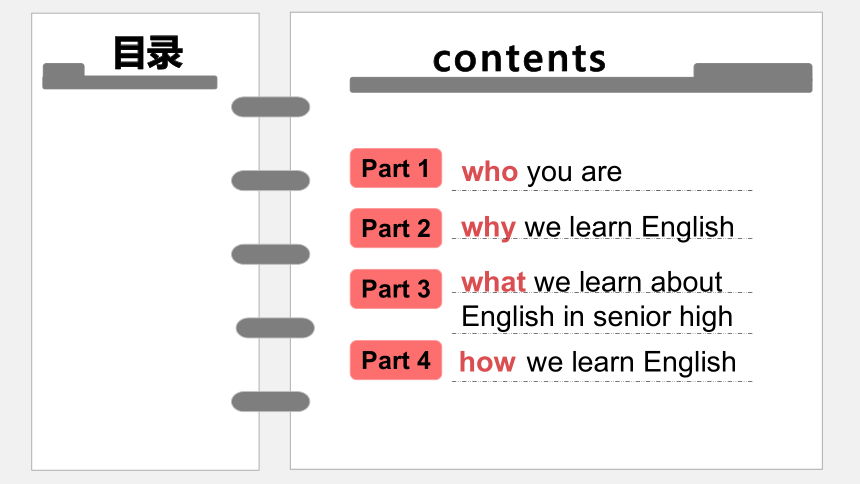
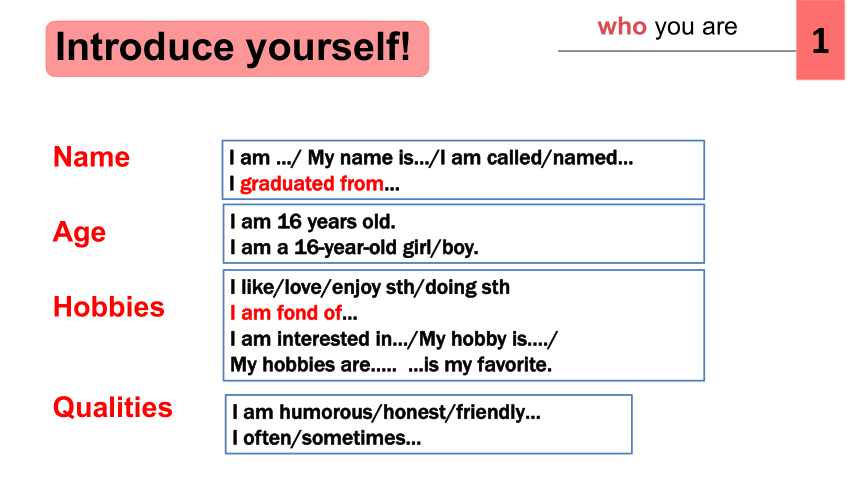
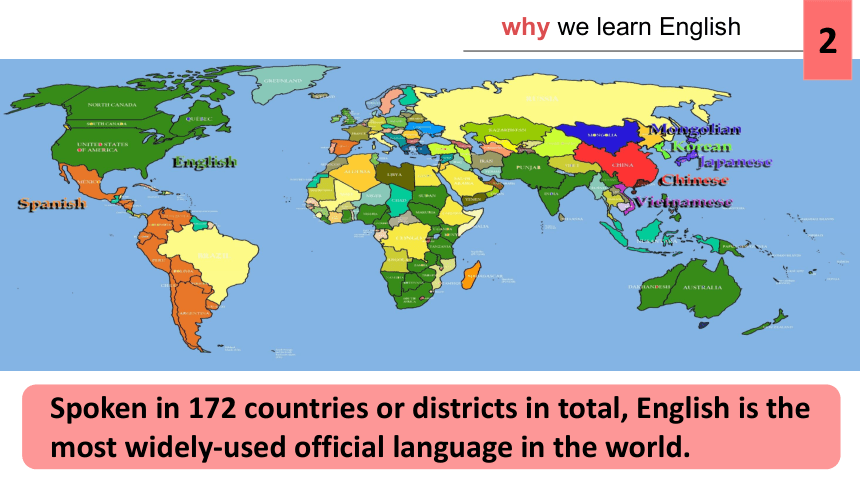


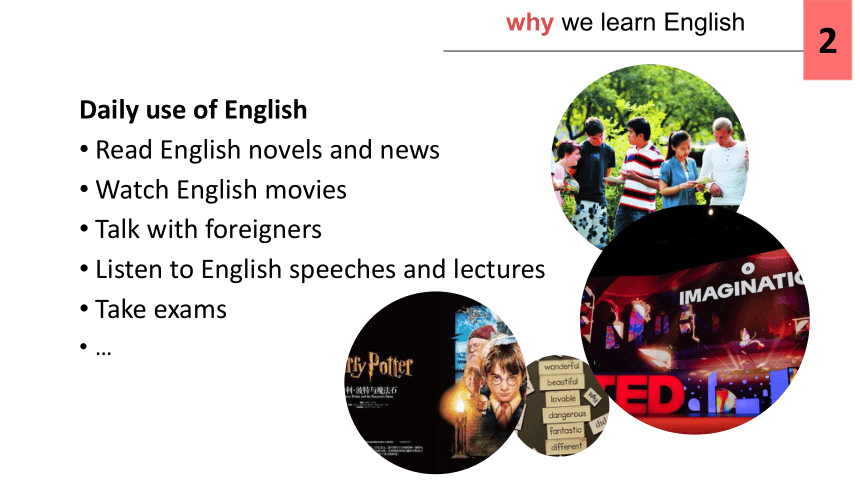
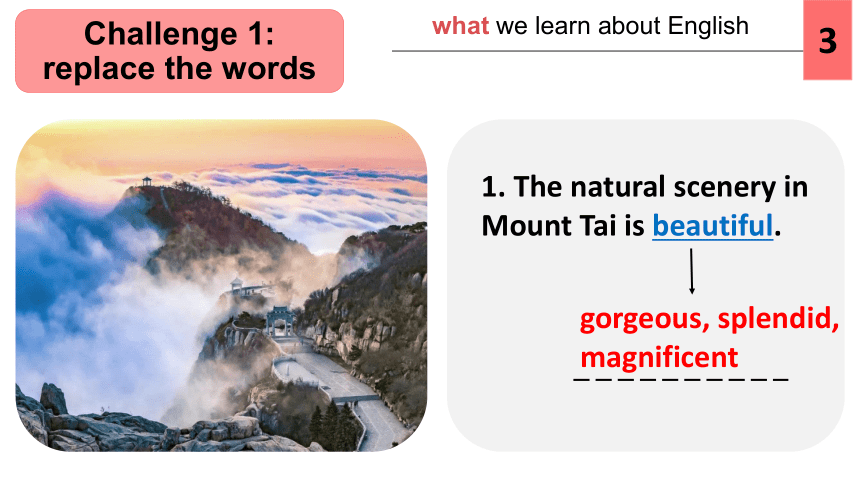
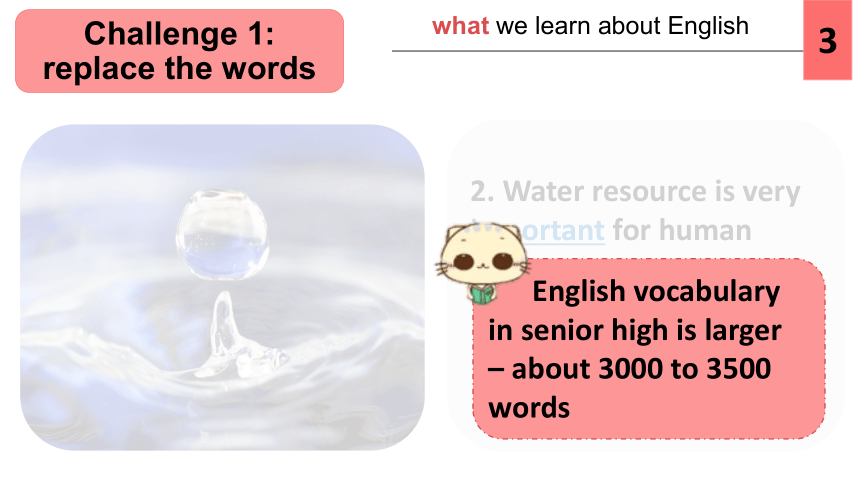
文档简介
(共27张PPT)
The First Lesson
Congratulations to You!
Welcome to Our School!
目录
contents
who you are
why we learn English
what we learn about
English in senior high
how we learn English
Part 1
Part 2
Part 3
Part 4
who you are
Introduce yourself!
1
Hobbies
Name
Age
I am .../ My name is…/I am called/named...
I graduated from...
Qualities
I am 16 years old.
I am a 16-year-old girl/boy.
I like/love/enjoy sth/doing sth
I am fond of...
I am interested in…/My hobby is…./
My hobbies are….. ...is my favorite.
I am humorous/honest/friendly…
I often/sometimes…
Spoken in 172 countries or districts in total, English is the most widely-used official language in the world.
why we learn English
2
why we learn English
English is the most important foreign language in China.
2
你们没有资格在中国的面前说
你们从实力的地位出发同中国谈话
English is a tool, a window and a weapon for us to communicate with the world and to earn respect.
why we learn English
2
Daily use of English
Read English novels and news
Watch English movies
Talk with foreigners
Listen to English speeches and lectures
Take exams
…
why we learn English
2
1. The natural scenery in Mount Tai is beautiful.
gorgeous, splendid, magnificent
what we learn about English
Challenge 1: replace the words
3
2. Water resource is very important for human beings.
Challenge 1: replace the words
essential, crucial, indispensable
English vocabulary in senior high is larger
– about 3000 to 3500 words
what we learn about English
3
Challenge 2:
fill in the blanks
(语法填空)People __________(object) to(反对 )seat belt installation (安装)suggest that children are already well protected by the school buses _________ follow the Nation Highway Traffic Safety Administration’s (NHTSA) safety requirements set in 1977.
English grammar in senior high is more complicated.
what we learn about English
3
Challenge 3: guess how many words in the passage
2021年高考英语全国乙卷D篇:344单词
Challenge 3: guess how many words in the passage
2021年高考英语全国新高考I卷D篇:300单词
Reading passages in senior high is longer- about 280-350 words each passage
12分
Challenge 4:
score the writing
what we learn about English
3
Compared with junior high, English in senior high is more difficult, for the vocabulary is larger, grammar is more complicated, reading passage is longer and writing is more strict.
what we learn about English
3
How we learn English
Discuss
4
1. 相信自己能学好英语,不要轻言放弃。
2、上课眼到、口到、手到、心到,积极参与课堂活动。
坚决抵制哑巴英语。
4 、早读声音一定要响亮。给自己规定任务。
6、作业认真按时独立完成。书面/口头;纸质/平板;上交/不交
5、多背诵一些好文章和好句子。
3、多听、多读、多写、多练。
1.一本笔记本(至少够一学期用)
2.一本作文收集本(范文、好句子,随笔)
3.一本词典 高考英语3500
4.一本课外读物或英文报刊 黑布林英语阅读,书虫
Requirements
高中阶段英语学科特点(Characterisitics about Senior English)
(1)词汇量:初中:1600个单词,200-300个短语
高中:3500个单词,400-500个短语
扩充词汇量是高中英语学习的首要任务
(2)语法:初中:浅显零碎
高中:系统复杂(从句、虚拟语气等)
(3)阅读:篇目长(词数、长难句),难度大,对思维能力要求高
阅读是学好高中英语的关键
要求学生能读懂书、报、杂志中关于一般性话题的简短文段以及公告、说明、广告等,并能从中获取相关信息。
(4)写作:难度加大
初中:记叙文-高中:应用文,读后续写
(5)学习方法:初中:依赖性学习,机械记忆练习
高中:自主学习,主动质疑,勤于思考,善于归纳
高一上学期英语学科的重点和难点
词汇:从课本中的课标词汇;从阅读材料中获取的其他常见词汇
语法:
1. 动词
1)现在进行时表示将来的用法
2)被动语态
2. 直接引语和间接引语
3. 定语从句
1)复习由关系代词that,which,who引导的定语从句
2)由关系代词whose, 介词+which/whom引导的定语从句
3)由关系副词where,when,why引导的定语从句
4)限制性定语从句和非限制性定语从句
高一新生面对的问题
1.环境和心理的变化
2.教材难度加大
3.跟不上教师的节奏,不能合理安排自习时间
4.阅读面窄,阅读能力差
5.缺乏良好的学习习惯
6.来自于高考的竞争压力。
Good learning habits:
1.Learn to use dictionaries and Internet.
2.Learn to take notes.
如何做笔记?
在书上做笔记 不同颜色的笔在重点单词、短语及句子下划线 标出新句型 ;标出旧句型;标出介词和连词;标出新的短语和词组;划出课文中的关键句
在笔记本上做笔记
1).重点单词和短语
2).每单元的语法
3. Learn to listen to me and students in class.
4. Learn to finish your homework by yourself in time.
5.Preview
(1)、预习生词: 上课前,要把对话或课文中的生词进行预习。
①正音; ② 记单词的拼写形式。在学习生词的同时,联想学过的词,找出特点,进行比较记忆;③借助参考书或词典来查阅其用法,并适当记录。
(2)、预习课文:在预习好生词的基础上,同学们要预习课文。
①要读课文
②要独立思考,逐句去理解,搞懂文章大意,若遇到不理解的词句,可以借助工具书查阅,或请教他人,或在书上作上记号,以待课上解决。
6. Review lessons in time.
7. Pay attention to your handwriting.
8.Do hands up when you know sth. or have something.
Speak loudly & clearly.
No chatting!
No sleeping, eating or drinking.
Never miss or forget homework.
英语单词记忆方法
Ways to Memorize English Words
1. 联想记忆法
overhear
无意听到
“听”
listen to
hear
obey
pick up
收听
“开”
open (the door)
turn on
(the light)
drive (the car)
fly (the plane)
operate
(the machine)
run (a factory)
open up
the west
“说”
1. 说英语
2. “你好!”他说。
3. 你刚在跟谁说话?
4. 你说的是实话吗?
5. 你们聊了些什么?
6. 我要说明一下游戏规则。
7. 请尽量说服他。
8. 老师批评了他。
9. “如果我妈发现了,她会说死我的!”
10. 特朗普在会议上发表了演讲。
speak English
'Hello!' she said.
Who were you talking to just now
Are you telling the truth
What were you chatting about
I need to explain the rules of the game.
Please try and persuade her.
The teacher criticized him.
“If mom finds out, she'll scold me!”
Trump addressed a meeting.
Trump delivered a speech in the meeting.
“看”
1. “我看到你内心的野兽,看到你的痛苦”
2. 她看了看我,笑了。
3. 他在看电视。
4. 我很喜欢看书。
5. 她去北京看望朋友了。
6. 我得在家看我妹妹。
7. 他瞥了一眼手表。
8. 我尖叫一声,大家都盯着我看。
9. 那个老人怒视着他。
“I see your monsters, I see your pain.”
She looked at me and smiled.
He is watching TV.
I like reading books very much.
She went to visit her friend in Beijing.
I have to look after/ take care of my little sister.
He glanced at his watch.
I screamed and everyone stared.
The old man glared at him.
英语单词记忆方法
Ways to Memorize English Words
2. 前后缀记忆法
1. able
2. courage
ability
disability
enable
disable
disabled
encourage
discourage
encouraging
encouraged
discouraging
discouraged
英语单词记忆方法
Ways to Memorize English Words
常见的前后词缀
un-
en-
dis-
-less
-tion
-ment
trans--
...
enlighten, enlarge, enrich, enable, encourage
unimportant, unemployed, undetermined
进入某种状态,使成为
否定;不,无,相反
dislike, disagree, disadvantage, disappear
没有,无;不受影响
meaningless, selfless, friendless, powerless
构成名词
function, instruction, attention, production
构成名词
government, pavement, equipment, fragment
表示“横贯”; “进入”, “成为”
transpacific; translate, transplant, transfer,
transform.
“非,否”; “相反”
间隔重复法:
一个单词能不能记住,取决于和它在不同场合见面的频率,不在于每次看着它的时间长短。一般想记住一个单词,每星期要和它(在不同场合)见三到四次面。
(1) 记生词的过程必须是由生到熟,一回生二回熟,三回四回顺口溜。这个过程要由滚动式的记忆来帮助完成。
(2) 每隔一周抽出两块整时间,每块约40分钟,把上周学过记过的单词重新复习一遍,用滚动式的记忆来防止前记后忘。
(3) 间隔重复法可采用先密后疏,开始按周计,以后可按双周+,-月计,对记单词来讲,不断重复,加深痕迹,就等于效益,有人研究数据表明,一周内每日看一次要比一天内看七次效果好。
“先规定自己一天背的词汇的数量,然后在一天中每隔一段时间把这些词汇通背一遍,相隔的时间不宜太短,以2-3小时为宜,早上背一遍,中午背一遍,下午背一遍,晚上再背一遍或两遍。隔几天后再把这些背过一遍。如此循环下去,会收到很好的记忆效果 .”
The First Lesson
Congratulations to You!
Welcome to Our School!
目录
contents
who you are
why we learn English
what we learn about
English in senior high
how we learn English
Part 1
Part 2
Part 3
Part 4
who you are
Introduce yourself!
1
Hobbies
Name
Age
I am .../ My name is…/I am called/named...
I graduated from...
Qualities
I am 16 years old.
I am a 16-year-old girl/boy.
I like/love/enjoy sth/doing sth
I am fond of...
I am interested in…/My hobby is…./
My hobbies are….. ...is my favorite.
I am humorous/honest/friendly…
I often/sometimes…
Spoken in 172 countries or districts in total, English is the most widely-used official language in the world.
why we learn English
2
why we learn English
English is the most important foreign language in China.
2
你们没有资格在中国的面前说
你们从实力的地位出发同中国谈话
English is a tool, a window and a weapon for us to communicate with the world and to earn respect.
why we learn English
2
Daily use of English
Read English novels and news
Watch English movies
Talk with foreigners
Listen to English speeches and lectures
Take exams
…
why we learn English
2
1. The natural scenery in Mount Tai is beautiful.
gorgeous, splendid, magnificent
what we learn about English
Challenge 1: replace the words
3
2. Water resource is very important for human beings.
Challenge 1: replace the words
essential, crucial, indispensable
English vocabulary in senior high is larger
– about 3000 to 3500 words
what we learn about English
3
Challenge 2:
fill in the blanks
(语法填空)People __________(object) to(反对 )seat belt installation (安装)suggest that children are already well protected by the school buses _________ follow the Nation Highway Traffic Safety Administration’s (NHTSA) safety requirements set in 1977.
English grammar in senior high is more complicated.
what we learn about English
3
Challenge 3: guess how many words in the passage
2021年高考英语全国乙卷D篇:344单词
Challenge 3: guess how many words in the passage
2021年高考英语全国新高考I卷D篇:300单词
Reading passages in senior high is longer- about 280-350 words each passage
12分
Challenge 4:
score the writing
what we learn about English
3
Compared with junior high, English in senior high is more difficult, for the vocabulary is larger, grammar is more complicated, reading passage is longer and writing is more strict.
what we learn about English
3
How we learn English
Discuss
4
1. 相信自己能学好英语,不要轻言放弃。
2、上课眼到、口到、手到、心到,积极参与课堂活动。
坚决抵制哑巴英语。
4 、早读声音一定要响亮。给自己规定任务。
6、作业认真按时独立完成。书面/口头;纸质/平板;上交/不交
5、多背诵一些好文章和好句子。
3、多听、多读、多写、多练。
1.一本笔记本(至少够一学期用)
2.一本作文收集本(范文、好句子,随笔)
3.一本词典 高考英语3500
4.一本课外读物或英文报刊 黑布林英语阅读,书虫
Requirements
高中阶段英语学科特点(Characterisitics about Senior English)
(1)词汇量:初中:1600个单词,200-300个短语
高中:3500个单词,400-500个短语
扩充词汇量是高中英语学习的首要任务
(2)语法:初中:浅显零碎
高中:系统复杂(从句、虚拟语气等)
(3)阅读:篇目长(词数、长难句),难度大,对思维能力要求高
阅读是学好高中英语的关键
要求学生能读懂书、报、杂志中关于一般性话题的简短文段以及公告、说明、广告等,并能从中获取相关信息。
(4)写作:难度加大
初中:记叙文-高中:应用文,读后续写
(5)学习方法:初中:依赖性学习,机械记忆练习
高中:自主学习,主动质疑,勤于思考,善于归纳
高一上学期英语学科的重点和难点
词汇:从课本中的课标词汇;从阅读材料中获取的其他常见词汇
语法:
1. 动词
1)现在进行时表示将来的用法
2)被动语态
2. 直接引语和间接引语
3. 定语从句
1)复习由关系代词that,which,who引导的定语从句
2)由关系代词whose, 介词+which/whom引导的定语从句
3)由关系副词where,when,why引导的定语从句
4)限制性定语从句和非限制性定语从句
高一新生面对的问题
1.环境和心理的变化
2.教材难度加大
3.跟不上教师的节奏,不能合理安排自习时间
4.阅读面窄,阅读能力差
5.缺乏良好的学习习惯
6.来自于高考的竞争压力。
Good learning habits:
1.Learn to use dictionaries and Internet.
2.Learn to take notes.
如何做笔记?
在书上做笔记 不同颜色的笔在重点单词、短语及句子下划线 标出新句型 ;标出旧句型;标出介词和连词;标出新的短语和词组;划出课文中的关键句
在笔记本上做笔记
1).重点单词和短语
2).每单元的语法
3. Learn to listen to me and students in class.
4. Learn to finish your homework by yourself in time.
5.Preview
(1)、预习生词: 上课前,要把对话或课文中的生词进行预习。
①正音; ② 记单词的拼写形式。在学习生词的同时,联想学过的词,找出特点,进行比较记忆;③借助参考书或词典来查阅其用法,并适当记录。
(2)、预习课文:在预习好生词的基础上,同学们要预习课文。
①要读课文
②要独立思考,逐句去理解,搞懂文章大意,若遇到不理解的词句,可以借助工具书查阅,或请教他人,或在书上作上记号,以待课上解决。
6. Review lessons in time.
7. Pay attention to your handwriting.
8.Do hands up when you know sth. or have something.
Speak loudly & clearly.
No chatting!
No sleeping, eating or drinking.
Never miss or forget homework.
英语单词记忆方法
Ways to Memorize English Words
1. 联想记忆法
overhear
无意听到
“听”
listen to
hear
obey
pick up
收听
“开”
open (the door)
turn on
(the light)
drive (the car)
fly (the plane)
operate
(the machine)
run (a factory)
open up
the west
“说”
1. 说英语
2. “你好!”他说。
3. 你刚在跟谁说话?
4. 你说的是实话吗?
5. 你们聊了些什么?
6. 我要说明一下游戏规则。
7. 请尽量说服他。
8. 老师批评了他。
9. “如果我妈发现了,她会说死我的!”
10. 特朗普在会议上发表了演讲。
speak English
'Hello!' she said.
Who were you talking to just now
Are you telling the truth
What were you chatting about
I need to explain the rules of the game.
Please try and persuade her.
The teacher criticized him.
“If mom finds out, she'll scold me!”
Trump addressed a meeting.
Trump delivered a speech in the meeting.
“看”
1. “我看到你内心的野兽,看到你的痛苦”
2. 她看了看我,笑了。
3. 他在看电视。
4. 我很喜欢看书。
5. 她去北京看望朋友了。
6. 我得在家看我妹妹。
7. 他瞥了一眼手表。
8. 我尖叫一声,大家都盯着我看。
9. 那个老人怒视着他。
“I see your monsters, I see your pain.”
She looked at me and smiled.
He is watching TV.
I like reading books very much.
She went to visit her friend in Beijing.
I have to look after/ take care of my little sister.
He glanced at his watch.
I screamed and everyone stared.
The old man glared at him.
英语单词记忆方法
Ways to Memorize English Words
2. 前后缀记忆法
1. able
2. courage
ability
disability
enable
disable
disabled
encourage
discourage
encouraging
encouraged
discouraging
discouraged
英语单词记忆方法
Ways to Memorize English Words
常见的前后词缀
un-
en-
dis-
-less
-tion
-ment
trans--
...
enlighten, enlarge, enrich, enable, encourage
unimportant, unemployed, undetermined
进入某种状态,使成为
否定;不,无,相反
dislike, disagree, disadvantage, disappear
没有,无;不受影响
meaningless, selfless, friendless, powerless
构成名词
function, instruction, attention, production
构成名词
government, pavement, equipment, fragment
表示“横贯”; “进入”, “成为”
transpacific; translate, transplant, transfer,
transform.
“非,否”; “相反”
间隔重复法:
一个单词能不能记住,取决于和它在不同场合见面的频率,不在于每次看着它的时间长短。一般想记住一个单词,每星期要和它(在不同场合)见三到四次面。
(1) 记生词的过程必须是由生到熟,一回生二回熟,三回四回顺口溜。这个过程要由滚动式的记忆来帮助完成。
(2) 每隔一周抽出两块整时间,每块约40分钟,把上周学过记过的单词重新复习一遍,用滚动式的记忆来防止前记后忘。
(3) 间隔重复法可采用先密后疏,开始按周计,以后可按双周+,-月计,对记单词来讲,不断重复,加深痕迹,就等于效益,有人研究数据表明,一周内每日看一次要比一天内看七次效果好。
“先规定自己一天背的词汇的数量,然后在一天中每隔一段时间把这些词汇通背一遍,相隔的时间不宜太短,以2-3小时为宜,早上背一遍,中午背一遍,下午背一遍,晚上再背一遍或两遍。隔几天后再把这些背过一遍。如此循环下去,会收到很好的记忆效果 .”
